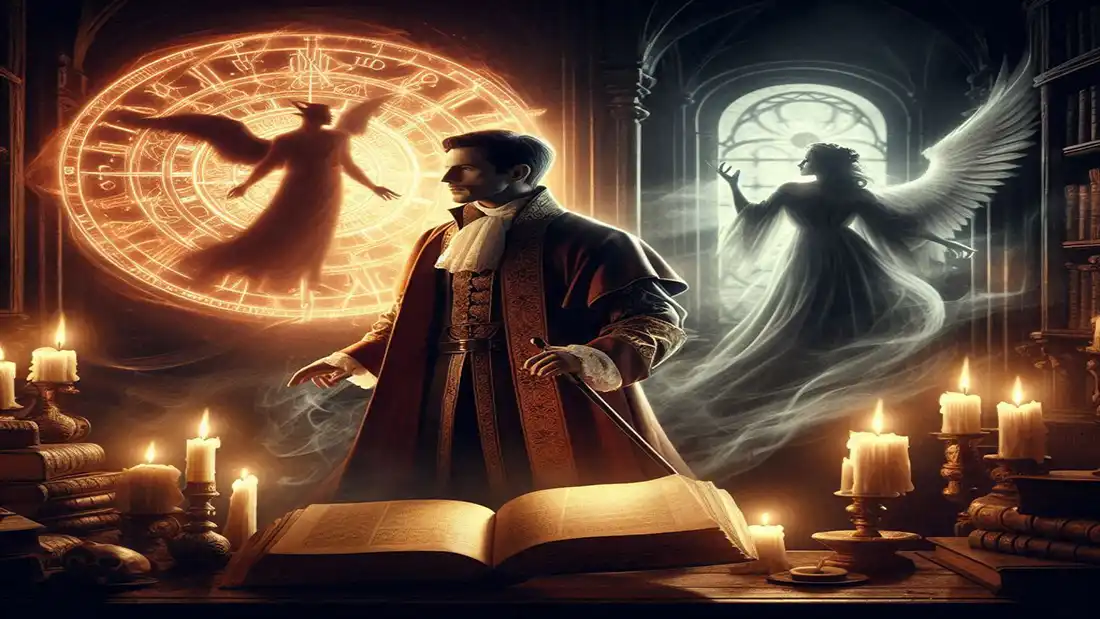Welcome to BD JOBZ PREPARATION, where we explore literature’s most intriguing themes and symbols that transcend time. One such masterpiece that has captivated audiences for centuries is Christopher Marlowe’s Doctor Faustus. The play, with its exploration of ambition, knowledge, and damnation, is steeped in powerful symbolism. In this blog post, we will delve into the various symbols present in Doctor Faustus, from magic and the seven deadly sins to light and darkness. By understanding the symbolism in Doctor Faustus, we can uncover the deeper moral lessons that make the play a timeless piece of literature.
Read More: Atheism in Doctor Faustus
Symbolism in Doctor Faustus

Christopher Marlowe’s Doctor Faustus is one of the most celebrated plays in English literature. Its themes, characters, and moral lessons have been widely analyzed for centuries. One of the key elements that make Doctor Faustus an enduring masterpiece is its use of symbolism. The play, which tells the story of Dr. Faustus, a brilliant scholar who makes a pact with the devil, is rich in symbols that enhance its themes of ambition, knowledge, and damnation. In this essay, we will explore the symbolism in Doctor Faustus and how it deepens our understanding of the play’s message.
The Symbolism of Magic
At the heart of Doctor Faustus is the figure of Faustus himself. His ambitious quest for knowledge and power leads him to make a pact with the devil, exchanging his soul for worldly pleasures and magic. The symbolism in Doctor Faustus is often embodied through various elements that reflect Faustus’s inner conflict, the consequences of his actions, and the struggle between good and evil. One of the most striking symbols in the play is the use of magic. Magic represents Faustus’s desire for control and power, transcending the limitations of human knowledge. However, this magic also symbolizes Faustus’s downfall. As Faustus delves deeper into magic, he loses touch with humanity and his moral compass, choosing illusion over truth. His increasing reliance on magic highlights his ultimate disconnect from salvation, emphasizing the dangerous nature of seeking forbidden knowledge.
The Good Angel and Evil Angel: Symbols of Conscience
The symbolism in Doctor Faustus extends beyond Faustus’s character to other elements of the play. One notable example is the appearance of the Good Angel and the Evil Angel. These two characters represent Faustus’s internal struggle between redemption and damnation. The Good Angel urges Faustus to repent and seek forgiveness, while the Evil Angel tempts him to continue on his path of sin. This symbolic conflict illustrates the central theme of free will and the moral consequences of one’s choices. The angels act as external representations of Faustus’s conscience, showing the audience the constant tug-of-war between salvation and damnation. The fact that Faustus ultimately ignores the Good Angel and follows the Evil Angel underscores his tragic flaw—his inability to choose redemption, despite having the opportunity to do so.
The Seven Deadly Sins as Symbols of Vice
Another key symbol in Doctor Faustus is the use of the seven deadly sins. These sins—pride, envy, wrath, sloth, greed, gluttony, and lust—are personified in the play as grotesque figures that appear to Faustus during his moments of indulgence. They symbolize the vices that Faustus succumbs to throughout the play. When Faustus summons these sins, he revels in them, enjoying the forbidden pleasures they offer. However, the sins also serve as a reminder of Faustus’s moral corruption. They represent the consequences of his pact with the devil and the eternal damnation he has chosen for himself. The sins are not only symbols of Faustus’s character flaws but also broader symbols of human weakness, tempting individuals to stray from the righteous path.
The Symbolism of Heaven and Hell
The symbolism in Doctor Faustus is also evident in the setting and imagery of the play. The contrast between heaven and hell is a recurring motif. Faustus’s choice to align himself with Lucifer and his rejection of God’s grace symbolizes his fall from grace. The descent into hell is portrayed as both a literal and metaphorical journey. In Act 2, Scene 1, when Faustus conjures Mephistophilis, the character describes the horrors of hell, symbolizing the eternal suffering that awaits those who turn away from salvation. Hell, in this sense, becomes a symbol of the irreversible consequences of Faustus’s choices. His refusal to repent and his failure to seek redemption trap him in a state of damnation, reinforcing the play’s theme of the consequences of one’s actions.
The Contrast Between Light and Darkness
In addition to heaven and hell, the symbolic imagery of light and darkness also plays a significant role in Doctor Faustus. Light often symbolizes knowledge, truth, and divine presence, while darkness represents ignorance, sin, and the absence of God. Faustus, in his quest for forbidden knowledge, constantly seeks the light of power and enlightenment. However, as he delves deeper into his pact with the devil, the light fades, and he becomes enveloped in darkness. This gradual loss of light symbolizes his spiritual blindness and the decline of his moral values. In the end, Faustus is left in darkness, unable to see the light of redemption that was always within his reach.
Symbolism in the Context of Human Ambition
The symbolism in Doctor Faustus also serves as a commentary on the human condition. Faustus represents the Renaissance man—a figure driven by the desire for knowledge, power, and control over his fate. His decision to sell his soul to the devil for worldly pleasures reflects the dangers of unchecked ambition and the temptation to overstep human limitations. Faustus’s tragic end is a warning to all who seek knowledge and power without considering the consequences. The play’s symbolism underscores the idea that human desires, when taken to extremes, can lead to destruction. It serves as a cautionary tale about the dangers of hubris and the importance of humility in the face of divine power.
Read More: Autobiographical Notes in Doctor Faustus
In conclusion, the symbolism in Doctor Faustus plays a vital role in bringing the moral and thematic complexity of the play to life. Through symbols such as magic, the struggle between light and darkness, and the personification of the seven deadly sins, Marlowe creates a powerful narrative that speaks to the human condition. As we’ve explored these symbols, it’s clear that Doctor Faustus offers more than just a tale of one man’s tragic choices—it serves as a cautionary reminder about the dangers of unchecked ambition. At BD JOBZ PREPARATION, we hope this exploration of symbolism helps you gain a deeper understanding of this literary classic.



